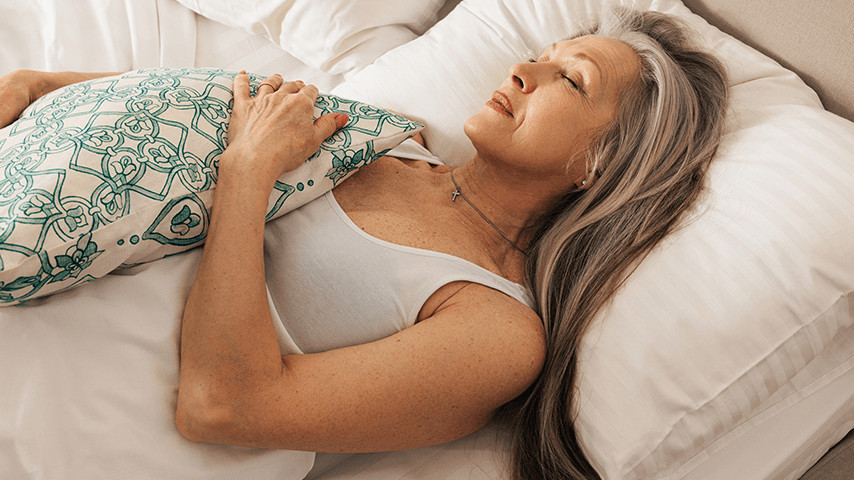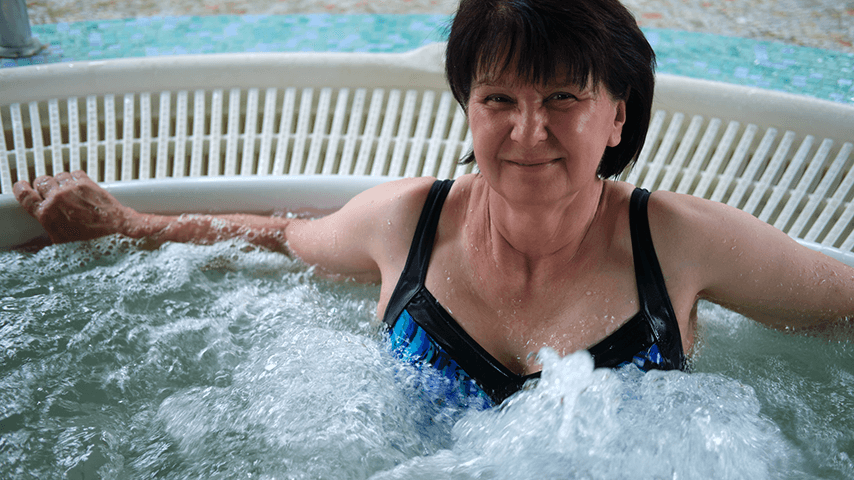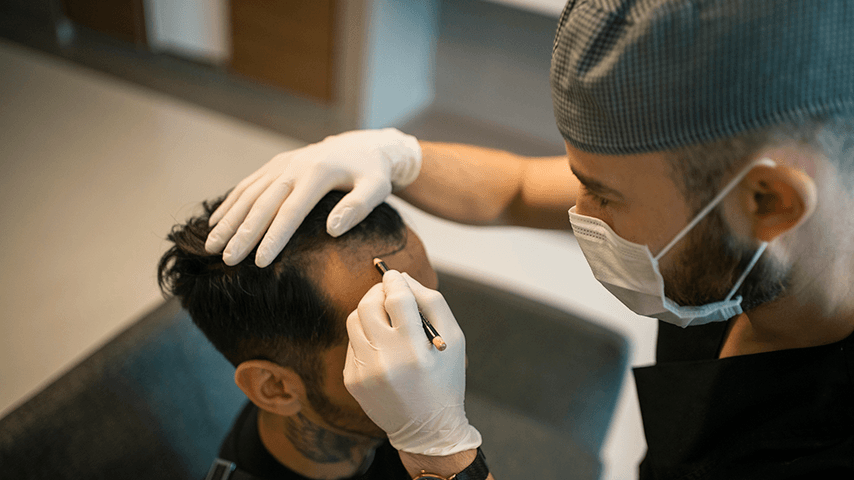
Related Topics
A cancer diagnosis can be frightening.
So can the many uncertainties surrounding it—including whether or not you’ll lose your hair.
If your cancer treatment plan includes chemotherapy, chances are high that you will. Usually, this loss is temporary and your hair eventually will grow back. Knowing this doesn’t make the experience any easier, though.
“Our hair is an essential part of our identity,” explained Amanda Krisher, Associate Director of Behavioral Health for NCOA’s Center for Healthy Aging. “That’s why losing it—or even just the idea of losing it—can be so stressful.”
“When it comes to chemotherapy hair loss, understanding what to expect can help ease your fears and empower you to cope,” she said. “Many things may feel out of your control right now. Information about hair loss can offer a sense of agency—because you get to decide if, when, and how to address it during your treatment.”
Start by finding answers to commonly asked questions about hair loss and chemotherapy below.
What is chemotherapy?
Chemotherapy (commonly called “chemo”) is a drug treatment that kills cancer cells. You may get these drugs through an I.V. in a clinic, take them at home in pill form, or a combination of both.
Cancer doctors (oncologists) prescribe chemo based on the type of cancer you have as well as other factors unique to you. Because these drugs are intentionally cytotoxic (poisonous to cells in your body), most chemo regimens are limited to a few months at a time.
Does chemotherapy cause hair loss?
Yes. But there are exceptions.
Many chemo treatments cause people to lose hair on their heads, face, and bodies. How much you will lose—and where you will lose it—depends a lot on the specific drugs you’re taking and for how long. You may go bald but keep your body hair. You may lose hair on your lower legs but not your arms.
On the flip side, some cancer drugs don’t cause hair loss at all. That’s why Krisher advises asking your oncology care team about it before you begin treatment.
“In the best case, you may discover that you’ll keep your hair—and avoid worrying about it altogether,” she said. “Even if not, having the conversation helps set your expectations.”
Does cancer cause hair loss?
No.
Typically, it’s the treatments you get for cancer—like chemo—that cause hair loss. If you’re otherwise healthy but losing more strands than usual, it’s much more likely because of something other than cancer. For instance, according to hair loss statistics, hereditary pattern baldness (androgenetic alopecia) is the most common reason why men and women lose their hair.
Some reports suggest that specific types of cancer can make your hair fall out. For instance, if you have melanoma or another skin cancer directly on your scalp, the cancer cells could damage your hair follicles and cause you to shed. That said, only 5% of all melanomas occur on the scalp—and those that do tend to happen in people age 65 and older whose hair is already thinning or who are bald.1 In other words, you or your doctor would notice a suspicious mole or lesion on your head before any associated hair loss.
Why does chemo cause hair loss?
First, it helps to understand how cancer develops and acts.
Most cancers start in cells whose genetic material—their DNA—has been damaged in some cells. Because of this damage, these cells don’t have the instructions they need to grow, divide, and die off the way they should. Instead, they multiply rapidly and turn into tumors. These tumors can be solid (a mass) or liquid (in the blood or bone marrow).2
Chemo drugs work by targeting these fast-growing cells. That’s good news. But the cells in our hair follicles also multiply rapidly, especially during times of active growth.3 Chemotherapy hair loss happens because these drugs can’t tell the difference.
(This is unlike age-related hair loss, which sometimes goes hand-in-hand with prescription medications like blood thinners and statins. Chemo drugs specifically affect the hair follicle; these other medications don’t. Their effects tend to be more systemic).
Does all chemotherapy cause hair loss?
No.
According to the American Cancer Society, the types of chemo that are most likely to cause hair loss are high- to moderate-dose I.V. drugs given every three weeks. (See a list). Still, even lower-dose weekly treatments can cause it. Other factors—including your diet, whether you smoke, and if your hair is thinning already—play a role, too.
Thanks to ongoing research and development, scientists continue to develop more targeted and effective chemotherapies that do less damage to hair follicles. Still, you most likely will lose some or all of your hair while in treatment. The encouraging news is that chemotherapy hair loss is usually reversible.
Stages of chemotherapy hair loss
A single course of chemotherapy usually lasts between 3–6 months and consists of alternating periods of active treatment and rest time.4 Some courses are shorter while others can extend out for a year or more. A lot depends on the type of cancer you have, how advanced it may or may not be, and which drug(s) your oncologist prescribes.
Regardless of chemotherapy regimen and length, hair loss and recovery follows a fairly predictable pattern:5,6,7
During treatment
- Weeks 1–2
You typically won’t notice any hair loss at first. - Weeks 2–4
Your hair will start to fall out. During this stage, hair loss is usually patchy; you may notice clumps in your brush, on your pillow, or in the shower drain. - Weeks 5–11
You will continue to shed hair. Patchy loss progresses to severe and noticeable thinning. - Week 12
Your hair loss will be complete and will remain that way until the end of your chemotherapy regimen.
After treatment
- Weeks 1–2
Your hair will start to regrow. - Weeks 2–4
Your regrowth becomes more noticeable. You may see some very fine, soft “peach fuzz” on your scalp. - Weeks 4–12
Your hair density and length will continue to improve. By the end of 12 weeks, you may have as much as an inch of regrowth. - Weeks 12–24
Your hair continues to thicken and lengthen, filling in any remaining bald patches and becoming easier to style.
One thing to keep in mind: often, when your hair grows back, it’s a different color and texture than it was before. It may or may not stay this way; only time will tell.
How to prevent hair loss during chemotherapy
In most cases, you can’t prevent chemotherapy hair loss entirely. But there are steps you can take to help you look and feel better on the road to losing your hair. This, NCOA’s Krisher explained, can help you navigate your anxiety over the process.
“Pampering your hair and scalp, boosting your nutrition, trying out new styles and accessories—these are great self-care strategies that support your well-being and boost your confidence,” she said.
How to talk to your doctor about hair loss concerns
Before treatment starts, talk to your doctor about the potential for hair loss. You might ask such questions as:
- Am I likely to lose my hair?
- If hair loss is common with this treatment, when does that typically start to happen?
- What kind of referral can you give me for mental health support?
What is the best way to care for hair during chemotherapy?
Your hair is going to be extra fragile during this time, especially as your treatment progresses. Your scalp will be, too. As much as possible, be gentle with both. You might:
- Switch to a mild shampoo (baby shampoos can be a good choice)
- Skip washing your hair every day
- Let your hair air dry instead of using a blow dryer
- Avoid using other hot styling tools like curling and straightening irons
- Forgo dyeing or perming your hair
- Use a soft-bristled brush or wide-toothed comb
- Swap your cotton pillowcase for a silk or satin one
Once your hair loss becomes noticeable, you may find comfort in cutting it shorter or even shaving it off completely. “Of course, this is a very individual choice,” Krisher said. “Sometimes it eases anticipatory stress—that constant worry about what is going to happen with your hair and when. But not everyone is comfortable taking that leap.”
If that’s you, you might consider buying and wearing a new hat or scarf that camouflages your head and that has colors and patterns you love.
Natural ways to address hair loss during chemo
No matter what, a healthy diet is one of the best choices you can make. Getting the right nutrients in your diet won’t stop your hair from falling out—but it will help your body better cope with and recover from your treatment. In turn, that will support healthier hair regrowth once your chemotherapy is done.&
You might also consider trying over-the-counter hair loss vitamins, minerals, and other natural supplements that are associated with healthier hair. These include:
- Biotin
- Zinc
- Vitamin D
- Saw palmetto
- Niacin
- Rosemary oil
- Tea tree extract
Before you do, check with your oncologist. While most of these supplements and products are safe to use, they may have hidden side effects or interactions with your chemotherapy or other medications.
Also keep in mind that some of them—especially rosemary and tea tree extracts—can be harsh on your skin.
Hair growth after chemotherapy
It’s natural to want to hurry this process along—but patience is your friend. As the timeline above shows, it will take at least six months for your hair to fully rebound after you complete your chemo. Even then, it may look and behave differently. Try to avoid coloring it or styling it aggressively for as long as you can. The same rules of gentleness that applied before are just as helpful now.
Can medicine help regrow hair after chemotherapy?
Maybe. But there are considerable caveats.
There are many over-the-counter and prescription hair loss medications available. You’ve likely already heard about Minoxidil (brand name Rogaine®), which consistently proves to be among the best hair loss treatments for men and the best hair loss treatments for women. Minoxidil is widely available over-the-counter for topical use on your scalp. This can make it tempting to use.
At the same time, Minoxidil is a chemical that can irritate your scalp. You may prefer to let your hair follicles fully heal before trying it.
Other treatments—like finasteride (brand name Propecia®), spironolactone, and corticosteroids—carry the risk of negative interactions and side effects. Your oncologist can help you determine whether or not such treatments make sense for you.&
What else helps hair growth after chemo?
While more studies are needed, research shows that “scalp hyperthermia” may reduce chemotherapy hair loss.6 This treatment involves chilling the skin on your head to slow the blood flow to your scalp. In turn, this helps prevent toxic chemotherapy drugs from reaching your hair follicles. This also may help your follicles rebound more quickly after treatment.
Not everyone enjoys wearing cold caps during chemo, however. Their iciness can give you headaches and make you uncomfortably chilly. And they need to fit tightly to work well.
FAQ
How long should I wait to color my hair after chemotherapy?
There’s no one-size-fits-all answer. When your hair first grows back, it might be a different color than it once was—but it may not stay that way. Consider waiting to see what happens before applying the dye. Avoiding harsh chemicals also helps your scalp heal better.
Can cold caps help with chemotherapy hair loss?
Maybe. These caps slow blood flow to the scalp and therefore reduce the amount of chemo that reaches the hair follicles. Scalp cooling caps work best when they fit tightly, which means that people with extra thick, curly hair may not benefit from using them.
Can radiation therapy cause hair loss?
Yes. As with chemotherapy, the amount of hair loss depends on the dose and duration of treatment. It also depends on the site. Radiation therapy only causes hair loss in the area of the body being treated, and nowhere else.
How long does it take to lose your hair during chemotherapy?
Typically, hair loss begins around 2–4 weeks into treatment. Most people will have lost all of their hair by the end of 12 weeks. Usually, this hair loss is reversible; once chemo treatment ends, initial regrowth can occur within a few weeks.
Sources
1. Gaetano Licata et al. Diagnosis and Management of Melanoma of the Scalp: A Review of the Literature. Clinical, Cosmetic, and Investigational Dermatology. Oct. 7, 2021. Found on the internet at https://www.dovepress.com/diagnosis-and-management-of-melanoma-of-the-scalp-a-review-of-the-lite-peer-reviewed-fulltext-article-CCID
2. National Library of Medicine. In brief: How do cancer cells grow and spread? April 25, 2022. Found on the internet at https://www.ncbi.nlm.nih.gov/books/NBK279410/
3. Ezra Hoover et al. Physiology, Hair. StatPearls Publishing. July 30, 2023. Found on the internet at https://www.ncbi.nlm.nih.gov/books/NBK499948/
4. Kirsten Nunez. How Long Can Chemotherapy Take? Healthline. April 13, 2021. Found on the internet at https://www.healthline.com/health/cancer/how-long-is-chemotherapy
5. National Library of Medicine. Overview: Hair loss in chemotherapy. Jan. 11, 2023. Found on the internet at https://www.ncbi.nlm.nih.gov/books/NBK547552/
6. Mayo Clinic. Chemotherapy and hair loss: What to expect during treatment. March 7, 2024. Found on the internet at https://www.mayoclinic.org/tests-procedures/chemotherapy/in-depth/hair-loss/art-20046920
7. Zawn Villines. When does hair grow back after chemo? Medical News Today. Aug. 22, 2024. Found on the internet at https://www.medicalnewstoday.com/articles/319446


